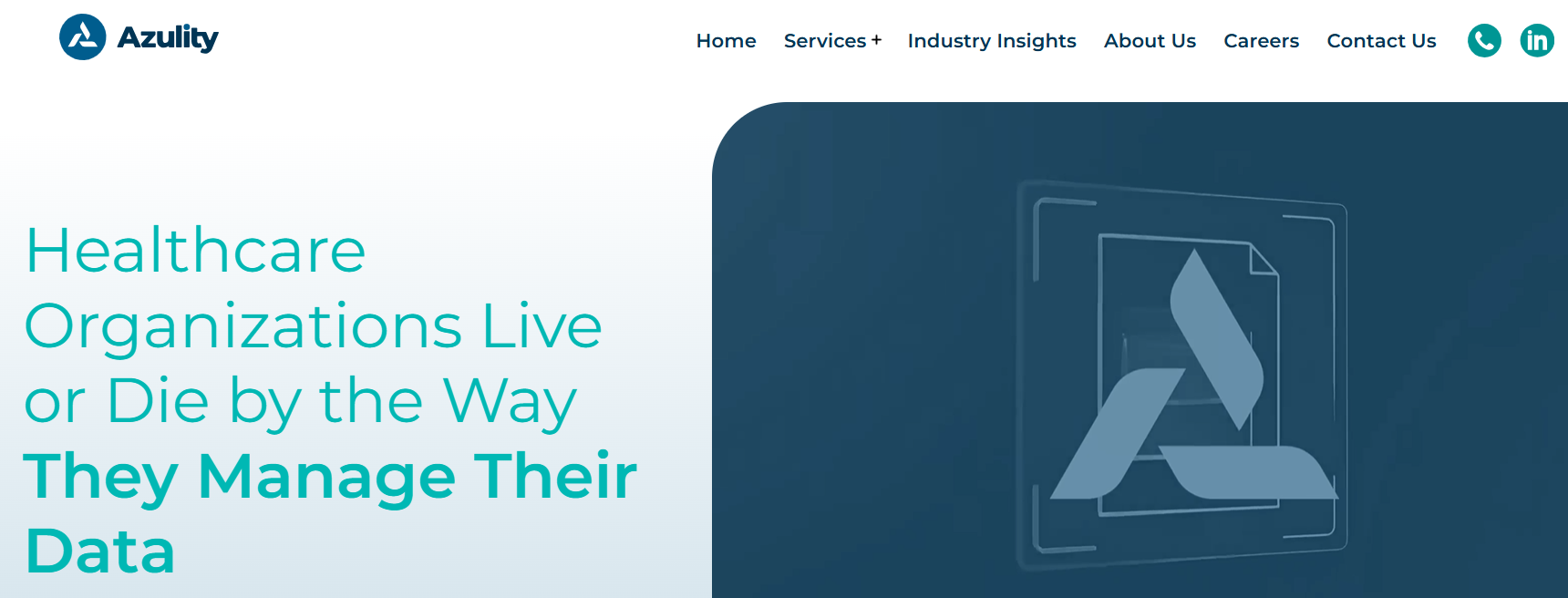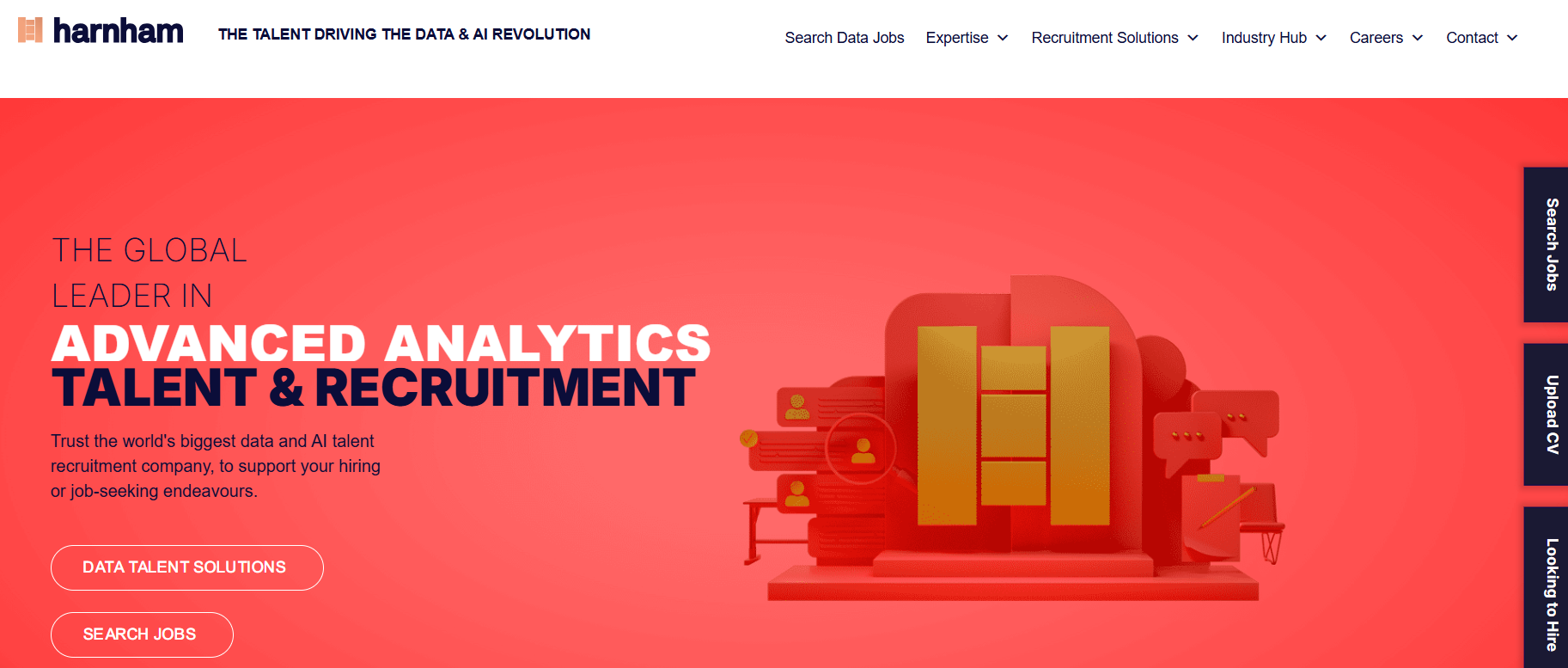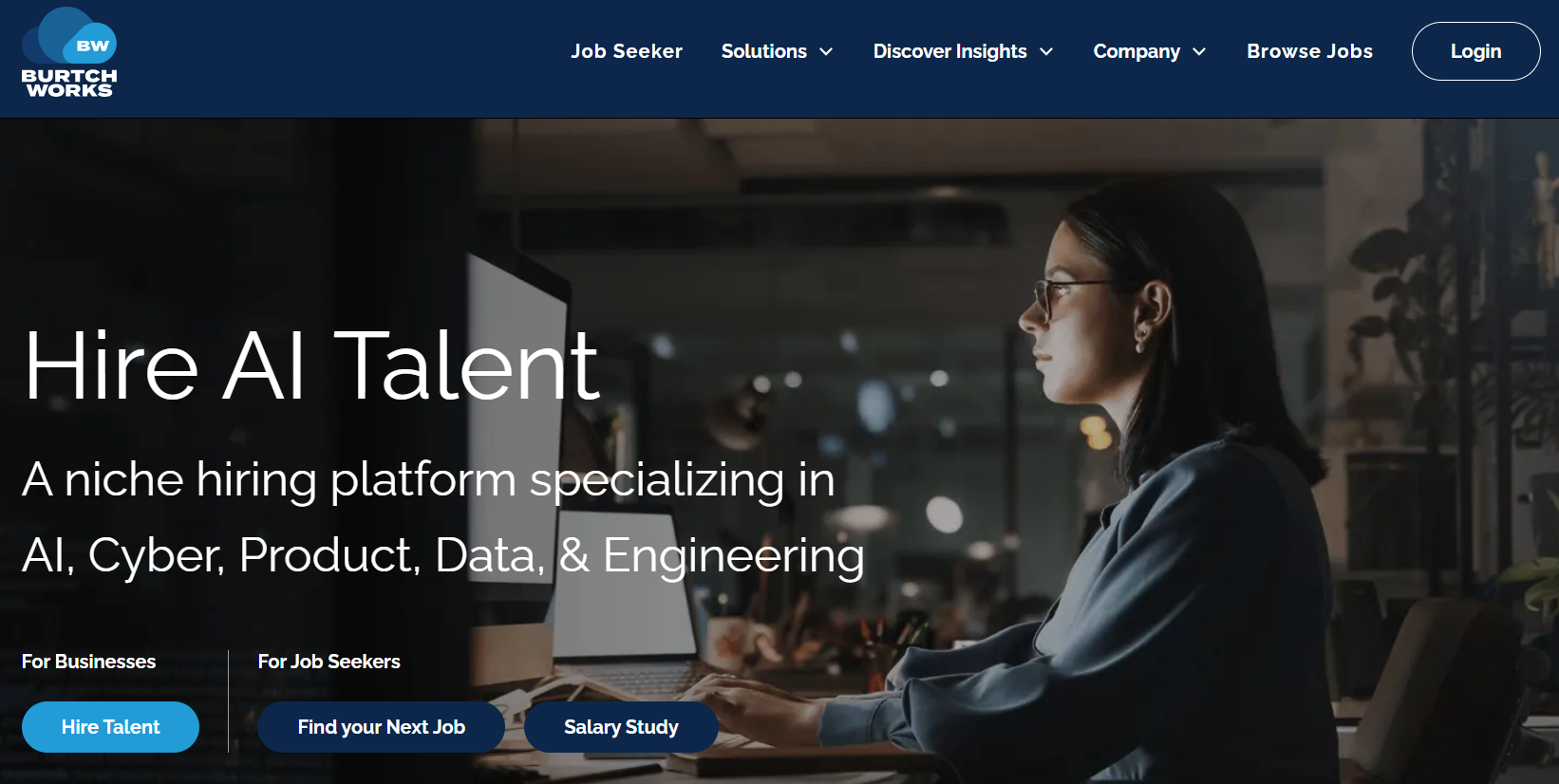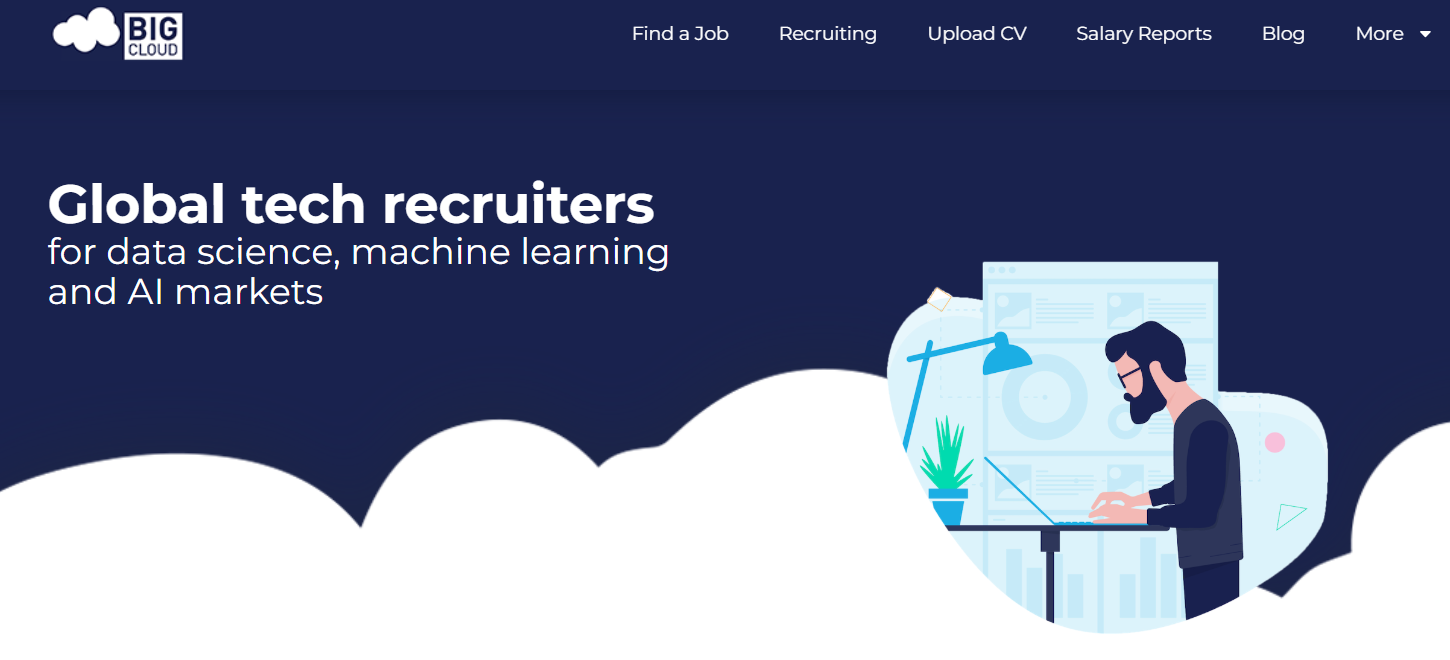Finding qualified data experts can feel like searching for a needle in a haystack. The ongoing shortage of data professionals makes it challenging for organizations to find the right candidates for their open positions. This is especially true for businesses in the healthcare sector, where data roles require specialized knowledge to ensure accurate analysis and reporting.
If you’re asking yourself how to hire data scientists, data science recruiters can help. This guide will explore the ins and outs of working with data science recruiters to allow healthcare organizations through innovative data management.
Data science recruiters can help you quickly find qualified candidates with the right skills for your organization’s unique data needs. Azulity’s provider credentialing services can help healthcare organizations achieve their goals by streamlining the process of verifying the qualifications of data professionals and other healthcare providers.
Responsibilities of Data Scientists


Data scientists possess a unique skill set that allows them to collect, analyze, and interpret complex data to help organizations solve problems and make better business decisions. They apply many of the same techniques as statisticians and data analysts but go further by using advanced algorithms, machine learning, and predictive modeling to uncover the hidden potential of data. Data scientists can work in any industry and often tailor their skills to meet the needs of specific employers, from tech companies to healthcare organizations.
Data scientists extract insights from complex data to solve problems and enable strategic decision-making. Develop predictive models to forecast future outcomes. Communicate findings to stakeholders through data visualization and reporting. Data scientists are often confused with data analysts and data science engineers. While these roles share responsibilities and require similar skill sets, they have distinct functions.
Data analysts focus on interpreting existing data to answer specific questions, while data scientists dig deeper to uncover hidden patterns and develop advanced processes for predictive analytics. On the other hand, data science engineers build the systems and architecture that allow data to be collected and analyzed. They create data pipelines that automate the processes of gathering, cleaning, and organizing data for analysis, and they work with both data scientists and data analysts to optimize these systems.
What Are a Data Scientist’s Qualifications?
Data scientists typically hold a master’s degree or Ph.D. in a quantitative field like mathematics, statistics, computer science, or engineering. Their advanced education provides the specialized knowledge to extract insights from complex data and develop predictive models.
A data scientist also has strong programming skills, particularly in statistical coding languages like R and Python. Proficiency in SQL is also essential, as data scientists often work with large datasets stored in relational databases.
Data scientists are also familiar with machine learning algorithms and libraries such as scikit-learn and TensorFlow. Finally, data scientists have experience with data visualization tools like Tableau and possess strong analytical skills to interpret complex datasets and communication skills to convey findings to stakeholders.
7 Best Data Science Recruiters
1. Azulity: Specialized Healthcare Data Solutions


Azulity excels in healthcare master data management and provider credentialing services. They bring proven expertise to implementing healthcare data solutions and credentialing across the U.S. Azulity’s comprehensive platform ensures consistent data synchronization across all systems and departments—eliminating costly, fragmented data problems.
Key features include healthcare master data management, provider master data management, reference data management, and credentialing. Azulity serves healthcare technology leaders from CIOs to VPs of data platforms and credentialing. Book a call to learn more about Azulity’s healthcare master data management services today!
2. Nexus IT: Fast-Tracking Data Science Recruitment


Nexus IT Group is an IT staffing agency founded by seasoned recruiters specializing in data science recruitment. Known for its expedited hiring process, it caters to the tech industry’s swiftly shifting needs. Leveraging its extensive network of data science professionals, Nexus IT Group provides access to a diverse pool of candidates, from entry-level data analysts to senior data scientists and chief data officers.
The agency’s foundation is based on the idea that job searches should be simple, educational, engaging, and fun. Beyond recruitment, Nexus IT Group offers ongoing support to ensure successful placements. They assist with onboarding, provide career development resources, and maintain strong relationships with clients and candidates to foster long-term success.
3. Harnham: Data Science Recruitment Experts


Harnham is a leading recruitment agency specializing in data science, analytics, and data engineering. With over 14 years of experience, Harnham has built a strong reputation for connecting businesses with top-tier talent.
They offer key services, including data science recruitment, data engineering recruitment, analytics recruitment, and contract and permanent placements. Choosing Harnham means benefiting from their extensive industry knowledge, global reach with UK, USA, and Germany offices, and personalized service tailored to your needs.
4. Burtch Works: Connecting Clients with Top Data Talent


Burtch Works is a premier recruitment agency focusing on data science and analytics talent. Headquartered in Evanston, Illinois, Burtch Works serves clients across the United States. Burtch Works is renowned for its extensive network of data professionals, enabling it to connect clients swiftly and efficiently with top-tier talent. Its team of experienced recruiters has profound industry knowledge, allowing them to provide insightful advice and tailored recruitment strategies to meet each client’s specific needs.
5. Big Cloud: Personalized Recruitment Solutions


Big Cloud is a recruitment agency focusing on data science, machine learning, and AI roles. Based in Manchester, UK, it caters to clients across Europe. It connects them with top-tier data talent. Big Cloud’s highly personalized approach ensures that each client receives tailored recruitment solutions. They work closely with companies to understand their specific requirements and organizational culture, enabling them to find candidates with the necessary skills and fit well within the company.
6. Decide Consulting: Focused Staffing for Data Science Roles


Decide Consulting specializes in IT and data science recruitment and is known for its focused staffing approach. With offices in Houston, Texas, they serve clients globally, offering tailored recruitment solutions to meet businesses’ needs. Decide Consulting leverages proprietary tools to identify candidates with the right blend of technical and problem-solving skills, ensuring a perfect fit for their clients.
7. Acara Solutions: Tailored Data Science Recruitment Services


Acara is a data science recruitment agency that provides specialized talent solutions to meet the growing demand for data-driven professionals. With a rich legacy of experience across various industries globally, Acara partners with clients, attentively listening to their needs and customizing visionary talent solutions that drive desired business outcomes.
Leveraging decades of expertise, Acara delivers various services worldwide, including contingent staffing, direct placement, executive search, employer branding, and workforce services. They value their employees, encourage them to succeed, and reward their positive efforts. Their actions are defined by honesty, integrity, fairness, equality, dignity, diversity, and individuality.
Related Reading
- Scrum Master Roles and Responsibilities
- What to Look for When Hiring a Project Manager
- Solution Architect Roles and Responsibilities
- How to Hire a Project Manager
- Project Executive vs Project Manager
- Mistakes to Avoid When Hiring Developers
- What to Ask When Hiring a Data Scientist
How to Hire Data Scientists Efficiently


Define the Role and Requirements
Effective hiring begins with clearly defining the role and its requirements. This helps you identify the skills and experience to look for in candidates to fill your position successfully.
Clarify Job Titles
Data science is a broad field with many job titles. The first step in hiring a data scientist is to determine the specific role you need. For example, you may need a data analyst, data engineer, statistician, or business analyst. Each position has distinct responsibilities, so it’s crucial to identify the exact role you’re hiring for before sourcing candidates.
Identify Key Skills
Outline the key skills and qualifications for your ideal candidate. For instance, a data engineer will require expertise different from a business analyst’s. To find the right fit for your team, create a list of essential skills to look for in applicants. This may include proficiency in Python or R, SQL, statistical analysis, data visualization, experience with Hadoop or Spark, and familiarity with cloud platforms like AWS or Azure.
Craft a Detailed Job Description
Once you’ve defined the role and requirements, create a job description to attract the right candidates. A detailed job ad will help you set clear expectations for applicants and filter out unqualified candidates.
Job Title
Use a clear and concise title that reflects the role.
Job Summary
Provide an overview of the position, emphasizing key responsibilities and objectives.
Responsibilities
Outline specific tasks, such as data collection, preprocessing, analysis, model building, and visualization.
Qualifications
Specify required education, experience, and technical skills.
Preferred Skills
Mention additional desirable qualifications.
Company Culture
Highlight your company’s values and any unique perks or benefits.
Application Instructions
Provide clear guidelines on how to apply.
Source Candidates
With a solid job description, start sourcing candidates for your data science position.
Job Posting Platforms
Advertise on LinkedIn, Indeed, Glassdoor, and specialized job boards.
Developer Communities
Engage with platforms like GitHub and Stack Overflow to find potential candidates.
Social Media
Utilize channels like Twitter and Facebook to share job openings.
Collaborations
Partner with local universities and coding boot camps to access emerging talent.
Employee Referrals
Encourage current employees to refer qualified candidates.
Screen Applications
As applications start rolling in, begin your candidate screening process to identify the top talent for your data science job.
Resume Review
Assess resumes for relevant experience and skills.
Portfolio Evaluation
Examine candidates’ portfolios or GitHub repositories to evaluate their work quality.
Assess Technical Skills
Data science jobs require candidates to possess a specific set of technical skills. Therefore, it is crucial to assess applicants’ abilities before bringing them in for interviews.
Coding Assessments
Use platforms like HackerEarth to administer coding tests that evaluate practical skills.
Project-Based Tasks
Assign tasks that mirror real-world challenges to assess problem-solving abilities.
Multiple-choice questions (MCQs)
Test theoretical knowledge in algorithms, statistical methods, and programming languages.
Conduct Interviews
Once you’ve narrowed your list of candidates, it’s time to conduct interviews to identify the perfect fit for your team.
Technical Interviews
Explore candidates’ technical expertise and problem-solving approaches deeper.
Behavioral Interviews
Evaluate cultural fit, communication skills, and teamwork abilities.
Project Discussions
Discuss past projects to understand candidates’ experience and contributions.
Evaluate and Decide
After completing the interview process, compile your notes to compare candidates and make a hiring decision.
Candidate Comparison
Compare candidates based on assessment results, interviews, and cultural fit.
Reference Checks
Contact references to verify candidates’ qualifications and work ethic.
Offer Negotiation
Extend offers and negotiate terms with selected candidates.
Onboard the New Hire
Your responsibilities don’t end once you’ve selected a candidate and they’ve accepted your offer. To set your new hires up for success, it’s crucial to correctly onboard them into your organization.
Orientation
Introduce the new hire to the team and company policies.
Training
Provide necessary training to acclimate them to your systems and processes.
Mentorship
Assign a mentor to support their integration into the organization.
Azulity specializes in healthcare master data management and provider credentialing services, bringing proven expertise in implementing healthcare data solutions and credentialing across the US. Our comprehensive platform ensures consistent patient, provider, location, and claims data synchronization across all systems and departments.
Key features include healthcare MDM, provider MDM, reference data management, credentialing, and provider enrollment. We serve healthcare technology leaders – from CIOs and CDOs to VPs of data platforms and credentialing – helping them eliminate the costly problems of fragmented data systems. Book a call to learn more about our healthcare master data management services today!
Related Reading
- Questions to Ask When Hiring a Programmer
- Hiring Dedicated Developers vs In-House Developers: What Is Better?
- Scrum Master vs Project Manager
- How to Hire a Software Developer
- Data Architect Vs Data Engineer
- How to Hire Programmers for a Startup
- Quality Analyst Interview Questions
- Data Architect Roles and Responsibilities
- Data Analyst Skills Needed
- Skills Required for Project Manager
- Quality Analyst Skills
- Data Architect Skills
Where to Find Data Scientists


1. Azulity: Where Healthcare Needs Data Science Experts
Azulity focuses on healthcare master data management and provider credentialing services. The company has extensive experience implementing healthcare data and credentialing solutions across the US. Azulity’s comprehensive platform synchronizes patient, provider, location, and claims data across disparate systems to eliminate the costly problems of fragmented data. We serve healthcare technology leaders to help them solve pressing data issues. Book a call with Azulity today to learn more about our healthcare master data management services.
2. LinkedIn: Your Go-To for Data Science Talent
LinkedIn boasts thousands of data professionals and technical experts. You can easily find a Data Scientist that fits your team’s needs. Use LinkedIn’s search filters and groups to locate Data Scientists. For example, use Boolean operators like “AND,” “OR,” and “NOT” to refine your search. You can also use the “inurl:” operator to find resumes with specific keywords.
Some of the most popular LinkedIn communities where you can find Data Scientists for hire are Data Scientist & Analyst, Data Science Central, and Data Science Community. Explore the LinkedIn company pages of tech companies or startups working in your field to find expert Data Scientists.
3. Online Job Boards: Cast a Wide Net to Find Data Scientists
Post job openings on Indeed, LinkedIn, Naukri, Glassdoor, and Stack Overflow Jobs. Craft a clear and detailed job description that outlines the specific skills, experience, and qualifications you’re looking for in a Data Scientist. While crafting the Data Scientist job description, make sure your compensation package and benefits are competitive within the job market. Following this strategy, you can effectively leverage job posting platforms to find and hire Data Scientists with the proper skill set.
4. Developer Communities and Forums: Find Your Next Data Scientist Here
When hiring a Data Scientist, explore platforms like GitHub and Stack Overflow. Evaluate potential candidates by examining their projects. Consider the quality of their code, how much they contribute, and their overall activity. Seek out individuals with Data Scientist skills that align with your project’s needs. If your company has GitHub projects, showcase them to attract developers interested in your work.
5. Tech Conferences and Meetups: Networking for Data Science Talent
Attend Data Science and related events to network with talented developers. By attending talks and discussions, you can gain insights into the interests and expertise of developers, helping you find candidates with exceptional Data Scientist skills. Search for the upcoming regional or global Data Science conferences online. Platforms like Eventbrite, Meetup, and Eventful allow you to search for and filter events. These events can be beneficial for hiring a data scientist for your organization.
6. Open Source Communities: Find Dedicated Data Science Contributors
Engaging with active contributors in Data Science-related open-source projects is a strategic approach to identifying talented Data Scientists. By participating in discussions, reporting issues, or even collaborating on these projects, you can discover individuals firmly committed to the Data Science community. These contributors often maintain public repositories and share their Data Science portfolios, showcasing their skills and expertise.
7. Online Learning Platforms: Discover Data Science Talent
Connect with Data Science enthusiasts on online learning platforms like Udemy and Coursera. Exploring the projects and assignments learners submit in these online courses can provide a glimpse into their practical skills and coding abilities. Data Science enthusiasts often use these platforms to showcase their proficiency. You can also find links to their personal portfolios or GitHub repositories. Thus, it will be easier to discover talented individuals who are actively enhancing their Data Scientist skills.
8. Local Universities and Coding Boot Camps: Find Aspiring Data Scientists
Collaborate with local academies and educational institutions to find aspiring Data Scientists. For instance, you can partner with coding bootcamps that offer Data Science courses. By engaging with instructors and students in these programs, you can identify promising talents eager to apply their newly acquired Data Scientist skills to real-world projects.
9. Social Media Channels: Data Science Talent is Just a Tweet Away
Use Twitter, LinkedIn, and Facebook to share projects and job openings. Engage with Data Science communities such as the Open Data Science community. Actively participating in discussions and direct outreach to individuals can help you hire developers with the right skills. Crafting engaging posts about your company’s Data Science initiatives and job opportunities can generate organic interest.
10. Referrals and Employee Networks: Tap into Existing Talent Pools
Promote employee referrals and leverage existing networks to gather recommendations to hire Data Scientists with the right skills.
Book a Call to Learn More About Our Provider Credentialing Services
Before contacting data science recruiters, you must create a solid job description to attract the right candidates. Data scientists have a unique skill set that can vary significantly from candidate to candidate. So, it’s important to pinpoint exactly what you need before you start the hiring process. Start by defining your goals.
What do you want to accomplish by bringing a data scientist on board? Do you need help with a specific project, or are you looking for someone to help you build a data science function from the ground up? Answering these questions will help you determine the exact skills and qualifications you need. Next, create a short description of your organization. This should include relevant information about your culture and the team the candidate will be working with. Finally, list the technical and soft skills the ideal candidate will possess.
Technical skills include familiarity with programming languages such as Python or R, machine learning experience, or data visualization tools proficiency. Soft skills encompass problem-solving, communication, and attention to detail. Once you have a firm grasp on what you need, write your job description to target these skills and clearly explain your expectations to prospective candidates.
Sourcing Data Science Candidates
Once you have a solid job description, it’s time to start sourcing candidates. Data science recruiters can help you find qualified candidates quickly, but you can also conduct your searches. Start by looking within your organization. If you have a data analyst already on staff, they may be able to transition into a data science role with some training.
You can also post your job description on job boards and promote the opening on your organization’s social media channels. But don’t stop there. Data scientists often prefer to work for companies with established data science functions, so look for candidates on platforms like GitHub or Kaggle, where they share their work publicly.
You can also search for candidates on professional networking sites like LinkedIn. There are also plenty of online communities and forums dedicated to data science. Consider posting your job opening on these platforms to reach candidates who may not be actively looking for a new position but are part of the data science community.
Streamlining the Hiring Process
Data science candidates are in high demand and can receive multiple job offers simultaneously. To secure the best talent, it’s crucial to streamline your hiring process and make hiring decisions quickly. You can start by eliminating unnecessary steps in your interview process. For example, if you’re working with data science recruiters, see if they can administer the technical skills assessment before you meet with any candidates.
This can help you gauge their abilities and determine if they have the skills necessary to succeed on the job before you waste time with an interview. Next, involve your technical team in hiring to ensure you make the right choice. Getting their input can help you keep the process objective and make decisions based on data rather than gut feelings. Finally, communicate openly with candidates throughout the process. Let them know if you’re running behind schedule and provide timelines for when they can expect to hear back from you.
Creating an Onboarding Plan
Onboarding doesn’t end after a new hire’s first week. Instead, it should be a structured process until the employee fully acclimates to their new role. For data science candidates, this can take time. Data science functions often operate independently from the rest of the organization.
As a result, new hires can feel isolated or overwhelmed when starting their new roles. You can help mitigate this by creating a detailed onboarding plan that allows data science employees to adjust to their new positions and your organization’s unique culture.
Start by introducing them to their team and outlining the specific projects they’ll be working on. Next, provide documentation that explains the goals of the data science function and how it relates to the organization’s broader objectives. Finally, regular check-ins should be scheduled to ensure they adjust to their new role and address any concerns.
